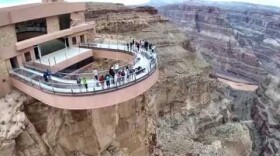Economists have criticized a proposal to pipe Colorado River water one hundred and forty miles from Lake Powell to southern Utah. They say the preliminary financial plan has fatal flaws.
The pipeline is intended to bring water to the growing population in Washington County, Utah. It’s expected to cost between one and two billion dollars. The state will pay the upfront cost, but passed a law saying water users must pay the state back.
University of Utah economist Gabriel Lozada analyzed the project. “The amount by which water prices would have to go up in order to pay for the pipeline is unprecedented,” he says. “It’s going to be taking their customers into completely uncharted territory.”
Lozada says water rates would have to increase nearly 600 percent to pay for the pipeline. He predicts high fees will encourage conservation. That will reduce revenue from water sales, making it difficult if not impossible to pay the state back.
Those findings are disputed by Jeremy Aguero, economic consultant for the Washington County Water Conservancy District. He says it’s too early in project development to do a full economic analysis.
“The amount that water rates have to go up are really dependent on a number of factors,” he says. “Number one, how much is it actually going to cost to develop the pipeline? Number two, how many consumers are you going to be spreading this cost over? Number three, are you going to use other sources of revenue?”
The details, Aguero says, won’t be finalized until the pipeline has gone through federal review.
Lozada wrote this letter to the Utah Governor summarizing his findings. The Washington County Water Conservancy District wrote this letter in response.








